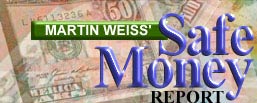NEWS AND COMMENTARY
October 4, 2000 
Strange New Sell Signal: Fed's Boilerplate
By Justin Lahart, TheStreet.com
More Disappointment To Come ... Weiss comments
NEW YORK - For most of the day, it wasn't such a bad market. The Nasdaq Composite Index, though volatile, spent most of its time in the green. The S&P; 500 was in decent shape, the Dow Jones Industrial Average solidly higher. Though not exactly the balm that a shell-shocked Wall Street needed to soothe its nerves, it was on balance a good day.
And then it wasn't. Around 2:15 p.m. EDT, the market sold off on the Fed's decision to hold interest rates steady.
Nothing about the announcement following the Federal Open Market Committee meeting should have been a surprise. Alan Greenspan and his merry band left rates unchanged, as expected. And then, using the same boilerplate language they have used at every meeting this year, they said that "the risks continue to be weighted mainly toward conditions that may generate heightened inflation pressures in the future."
Was that a surprise? No indeed. "This is not exactly mysterious," says Richard Berner, Morgan Stanley Dean Witter chief U.S. economist. "The statement was the statement that many of us could have written." With consumer spending still going strong, with unemployment still low, with oil prices doing what they've been doing, just about any economist you might have taken the time to ask would have told you that the Fed would remain more concerned about inflation than recession.
But the stock market apparently didn't think to ask an economist.
"There was some sense out there, at least among some people, that the Fed would signal it could be going for rate cuts by the end of the year," says Jim Volk, co-director of institutional trading at D.A. Davidson. And when the Fed did nothing of the sort, those people were sorely disappointed.
You can see how it could have happened. People live anecdotal lives, believing that the world at large bears a pretty near resemblance to the world they see. Help-wanted signs in front of the Tastee Freeze? The economy is smoking. Layoffs at the plant? Folks are in trouble.
On Wall Street, it is neither Tastee Freeze nor the plant that people watch so much; it is portfolios, and many portfolios are hurting. The S&P; is on track for its first negative performance since 1994. The old tech bellwethers have been taken out and shot. After a rocket ride of a bull market for much of the 1990s, these are austere times.
No, it is not that every investor, or even most investors, thought the Fed would say the risks to the economy are balanced. "There was kind of a slim hope toward the neutral," says Wally Chin, Prudential Securities futures trader.
But in the current environment, that slim hope, when dashed, did a lot of damage. The Nasdaq slipped into the red and then broke below 3521 -- the intraday low of Aug. 3 and a level where many hoped bargain hunters would come to market -- like nobody's business. And then things really fell apart.
"Everything came up for sale," says Todd Clark, W.R. Hambrecht head of listed trading. "It's a complete implosion and very, very poor action -- about as bad as you can get."

Investors may have been surprised that the Fed did not ease its bias toward raising rates, but the economic situation speaks for itself:
- Oil prices are high and will continue to rise in the near future as refineries operate at full capacity.
- The labor market is still tight -- the unemployment rate remains at 4.1%.
- Consumers continue to take on more and more debt as they spend beyond their means.
Inflation is still a problem and the Fed knows it. Indeed, it's potentially even more of a threat than before. Let's not forget the dollar is starting to decline against the euro. If it continues to fall, inflation will go wild.
You can bet the stock market knows this. That's why it collapsed yesterday. Smart money realizes that the Fed is keeping an eye on inflation, and will not hesitate to raise rates again, probably right after the elections.
|
 |
Subscribers: Check the latest
Weiss Stock Risk Ratings
before you make your next move!
Non-subscribers: Register Here for three free Weiss Stock Risk Ratings Reports
Sign-up to get SMR's News and Views Commentary emailed directly to you!
|




